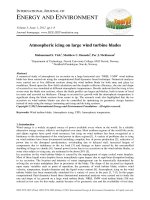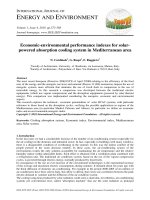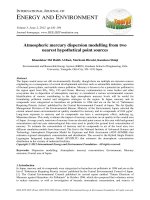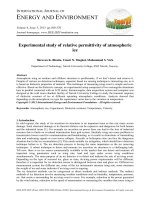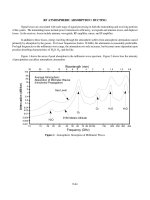RF ATMOSPHERIC ABSORPTION / DUCTING
Bạn đang xem bản rút gọn của tài liệu. Xem và tải ngay bản đầy đủ của tài liệu tại đây (42.38 KB, 2 trang )
10 15 20 25 30 40 50 60 70 80 90100 150 200 250 300 400
30 20 15 10 8 6 5 4 3 2 1.5 1.0 0.8
0.001
0.002
0.004
0.01
0.02
0.04
0.1
0.2
1
2
10
20
40
100
0.4
4
Wavelength (mm)
Frequency (GHz)
Average Atmospheric
Absorption of Milimeter-Waves
(Horizontal Propagation)
Sea Level
H2O
O2
H2OO2 H2O
9150 Meters Altitude
5-1.1
Figure 1. Atmospheric Absorption of Millimeter Waves
RF ATMOSPHERIC ABSORPTION / DUCTING
Signal losses are associated with each stage of signal processing in both the transmitting and receiving portions
of the system. The transmitting losses include power transmission efficiency, waveguide and antenna losses, and duplexer
losses. In the receiver, losses include antenna, waveguide, RF amplifier, mixer, and IF amplifier.
In addition to these losses, energy traveling through the atmosphere suffers from atmospheric attenuation caused
primarily by absorption by the gasses. For lower frequencies (below 10 GHz), the attenuation is reasonably predictable.
For high frequencies in the millimeter wave range, the attenuation not only increases, but becomes more dependent upon
peculiar absorbing characteristics of H O, O , and the like.
2 2
Figure 1 shows the areas of peak absorption in the millimeter wave spectrum. Figure 2 shows how the intensity
of precipitation can affect atmospheric attenuation.
0.001
0.002
0.005
0.01
0.02
0.05
0.1
0.2
0.5
1
2
5
10
20
50
3 5 10 30 100
100
50
25
12.5
2.5
1.25
0.25
Tropical
Downpour
Heavy Rain
Medium Rain
Light Rain
Drizzle
ATMOSPHERIC ATTENUATION
Frequency (GHz)
Rainfall rate
(mm/hr)
UPPER ATMOSPHERE
EARTH
5-1.2
Figure 2. Atmospheric Attenuation
Figure 3. Ducting
Ducting is an increase in range that an electromagnetic wave will travel due to a temperature inversion of the lower
atmosphere (troposphere) as shown in Figure 3. The temperature inversion forms a channel or waveguide (duct) for the
waves to travel in, and they can be trapped, not attenuating as would be expected from the radar equation. Ducting may
also extend range beyond what might be expected from limitations of the radar horizon (see Section 2-9).
The ducting phenomena is frequency sensitive. The thicker the duct, the lower the minimum trapped frequency.
A similar occurrence takes place with ionospheric refraction, however the greatest increase in range occurs in the
lower frequencies. This is familiar to amateur radio operators who are able to contact counterparts “around the world”.

